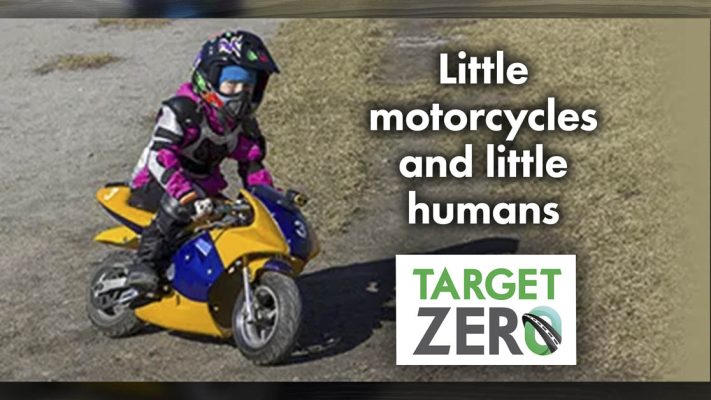
Target Zero Manager Doug Dahl answers a question about what the law says about children riding motorcycles in neighborhoods
Doug Dahl, manager
Target Zero
Q: I’ve noticed a proliferation of children riding small (but loud!) motorcycles around the neighborhood. Usually up and down the same street until presumably either their fuel runs out or their mother calls them in for dinner. Sometimes they have helmets, sometimes not. What does the law say about this kind of activity?
A: If I were 12 years old and had access to a pocket bike, I’d definitely want to ride it on the road. Twelve-year-old boys are kind of dumb that way. So parents, this one’s on you, both legally and as the responsible adult.

First, the legal stuff. We’re dealing with two parts here; the vehicle and the rider. You described the motorcycles as small and loud. The small part suggests they’re not a typical street-legal motorcycle, and the loud part indicates they’re not electric bikes. I’m guessing these are pocket bikes, mini versions of full-sized motorcycles. Pocket bikes don’t reach even the lowest bar for a street-legal gas-powered two-wheeler, the moped. Although many pocket bikes meet the 50-cc engine size limit for mopeds, they fall short on the safety end of things. Mopeds are required to have (and this is a partial list) mirrors, brakes, controls, headlight, taillight, brake light, tires, and muffler. Pocket bikes have substandard equipment (brakes, tires, controls) or lack them completely (mirrors, lights, muffler).
The other clear giveaway that a pocket bike isn’t street-legal: no license plate. Mopeds are required to be registered, and you won’t get a registration for a pocket bike if it doesn’t meet the safety requirements.
But let’s imagine that someone was able to find a pocket bike that met all the requirements for a moped and had it registered to ride on the road. That doesn’t make it legal for a child to ride it. A moped rider must be at least 16 and have a valid driver license. Riders must also wear a helmet.
There’s one more law I should mention, and this one is for the parents. It’s unlawful to allow your child to operate a motor vehicle on a public roadway “when such minor is not authorized hereunder or in violation of any of the provisions of this chapter.” In case you’re wondering about what’s in “this chapter,” it’s all the stuff mentioned in the previous paragraphs.
To summarize the potential legal consequences, the kid could get arrested for driving without a license, the parent could get an infraction for allowing their child to ride the pocket bike on the road, and the police could impound the pocket bike because it was operated by an unlicensed rider.
As inconvenient as they are, I’m less concerned about the legal consequences than the physical risks to a kid on a pocket bike. Looking back on my 12-year-old days, I didn’t have the judgment to make good decisions while riding my bike down the street. (Like the time I tried to jump a ramp built out of a sheet of plywood and a garbage can, crashing gloriously in the center of the road.) If I’d have had access to a bike with a motor, I’d have made the same bad decisions, but twice as fast.
Tragically, reality bears out that other kids also aren’t conscious of the risks. A quick internet search for kids crashing on pocket bikes returns too many responses of serious injury and fatal crashes. Pocket bikes can be fun, but a kid on an overpowered tiny motorcycle shouldn’t be competing with traffic on public roads. If you kid wants to ride a pocket bike, keep them off the road.
TheWiseDrive is hosted by Doug Dahl, a Target Zero manager for the Washington Traffic Safety Commission.

Also read:
- Opinion: Employers shouldn’t pay workers not to work: Paying people to strike should be a union’s jobElizabeth New of the Washington Policy Center argues that Senate Bill 5041 would burden employers and taxpayers by using unemployment funds to pay striking workers instead of requiring unions to support their members.
- POLL: Should Washington Raise the 1% Cap on Property Tax Increases?Clark County Today’s weekly poll asks whether Washington lawmakers should raise the current 1% cap on annual property tax increases.
- Letter: The more you knowCamas resident Anna Miller criticizes a recent remark by Rep. Jasmine Crockett as racist and demeaning, and outlines Republican contributions to civil rights history in her letter to the editor.
- Letter: City vehicles speeding on the highwaysVancouver resident Peter Bracchi raises concerns about excessive speeding by city-owned vehicles, based on GPS data received through a FOIA request.
- Opinion: The stage is set for a battle royaleRep. John Ley outlines key legislative battles in Olympia, raising concerns about tax hikes, tolling, and spending priorities in Washington state.










